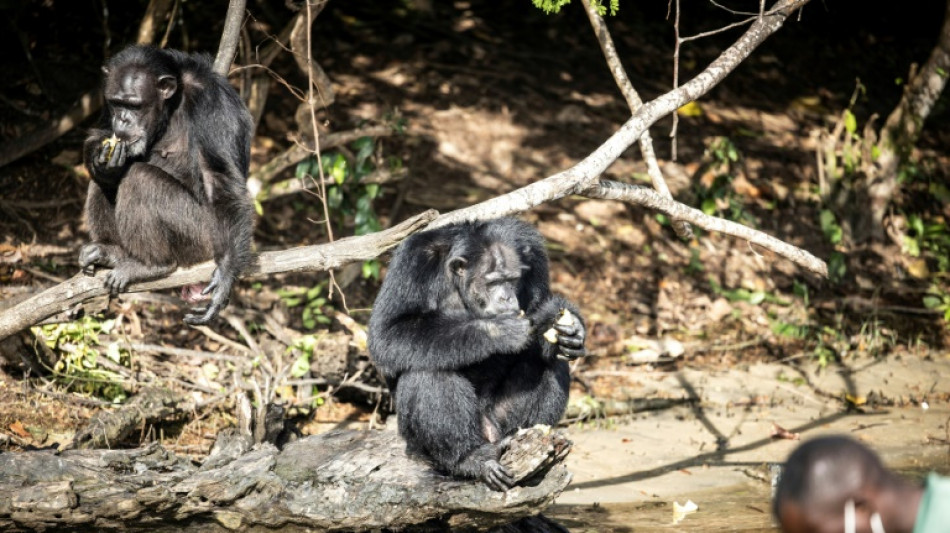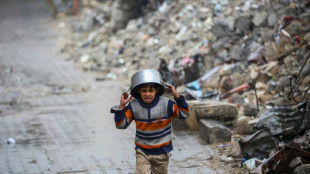
-
 Laos hostel staff detained after backpackers' deaths
Laos hostel staff detained after backpackers' deaths
-
Hong Kong LGBTQ advocate wins posthumous legal victory

-
 Ukraine says cannot meet landmine destruction pledge due to Russia invasion
Ukraine says cannot meet landmine destruction pledge due to Russia invasion
-
Rod Stewart to play Glastonbury legends slot

-
 Winter rains pile misery on war-torn Gaza's displaced
Winter rains pile misery on war-torn Gaza's displaced
-
'Taiwan also has baseball': jubilant fans celebrate historic win

-
 Russia pummels Ukraine with 'record' drone barrage
Russia pummels Ukraine with 'record' drone barrage
-
Paul Pogba blackmail trial set to open in Paris

-
 China's Huawei unveils 'milestone' smartphone with homegrown OS
China's Huawei unveils 'milestone' smartphone with homegrown OS
-
Landmine victims gather to protest US decision to supply Ukraine

-
 Indian rival royal factions clash outside palace
Indian rival royal factions clash outside palace
-
Equity markets retreat, dollar gains as Trump fires tariff warning

-
 Manga adaptation 'Drops of God' nets International Emmy Award
Manga adaptation 'Drops of God' nets International Emmy Award
-
China's Huawei launches 'milestone' smartphone with homegrown OS

-
 Philippine VP denies assassination plot against Marcos
Philippine VP denies assassination plot against Marcos
-
Four Pakistan security forces killed as ex-PM Khan supporters flood capital

-
 Hong Kong's legal battles over LGBTQ rights: key dates
Hong Kong's legal battles over LGBTQ rights: key dates
-
US lawmakers warn Hong Kong becoming financial crime hub

-
 Compressed natural gas vehicles gain slow momentum in Nigeria
Compressed natural gas vehicles gain slow momentum in Nigeria
-
As Arctic climate warms, even Santa runs short of snow

-
 Plastic pollution talks: the key sticking points
Plastic pollution talks: the key sticking points
-
Indonesia rejects Apple's $100 million investment offer

-
 Pakistan police fire tear gas, rubber bullets at ex-PM Khan supporters
Pakistan police fire tear gas, rubber bullets at ex-PM Khan supporters
-
Ronaldo double takes Al Nassr to brink of AFC Champions League last 16

-
 Pakistan police fire tear gas, rubber bullets at pro-Khan supporters
Pakistan police fire tear gas, rubber bullets at pro-Khan supporters
-
Hong Kong same-sex couples win housing, inheritance rights

-
 Indonesia digs out as flooding, landslide death toll hits 20
Indonesia digs out as flooding, landslide death toll hits 20
-
Liverpool's old guard thriving despite uncertain futures

-
 Mbappe takes reins for Real Madrid in Liverpool clash
Mbappe takes reins for Real Madrid in Liverpool clash
-
As AI gets real, slow and steady wins the race

-
 China's Huawei to launch 'milestone' smartphone with homegrown OS
China's Huawei to launch 'milestone' smartphone with homegrown OS
-
Porzingis and Morant make triumphant NBA returns

-
 Hong Kong top court affirms housing, inheritance rights for same-sex couples
Hong Kong top court affirms housing, inheritance rights for same-sex couples
-
Philippines, China clashes trigger money-making disinformation

-
 Most Asian markets drop, dollar gains as Trump fires tariff warning
Most Asian markets drop, dollar gains as Trump fires tariff warning
-
England 'not quivering' ahead of New Zealand Test challenge

-
 Bethell to bat at three on England Test debut against New Zealand
Bethell to bat at three on England Test debut against New Zealand
-
Trump vows big tariffs on Mexico, Canada and China

-
 New Zealand and England to play for Crowe-Thorpe Trophy
New Zealand and England to play for Crowe-Thorpe Trophy
-
Scheffler, Schauffele and McIlroy up for PGA Player of the Year

-
 Trump to face less internal pushback in new term: ex-commerce chief
Trump to face less internal pushback in new term: ex-commerce chief
-
Extreme weather threatens Canada's hydropower future

-
 More than 34,000 register as candidates for Mexico judges' election
More than 34,000 register as candidates for Mexico judges' election
-
Australia ban cycling's Richardson for life after UK defection

-
 Internal displacement in Africa triples in 15 years: monitor
Internal displacement in Africa triples in 15 years: monitor
-
'Remarkable global progress': HIV cases and deaths declining

-
 Social media firms raise 'serious concerns' over Australian U-16 ban
Social media firms raise 'serious concerns' over Australian U-16 ban
-
Tiger to skip Hero World Challenge after back surgery

-
 MLB shifts six 2025 Rays games to avoid weather issues
MLB shifts six 2025 Rays games to avoid weather issues
-
US women's keeper Naeher retiring after Europe matches


After life of trauma, Liberian lab chimps settle into retirement
Floating on a river boat near a Liberian island, vet Richard Ssuna watches intently as animal carers wade towards the shore hurling fruits and imitating chimpanzee calls as they go.
The beach is empty, but the sound of rustling and chimpish grunts begins to fill the green undergrowth. Slowly, an ape knucklewalks out onto the beach to grab some food.
He's a high-ranking member of his troop, explains Ssuna, as more chimpanzees follow. The younger ones gambol and hoot in delight as carers throw them bananas, palm nuts and cassava.
Sixty-five chimps are spread across six uninhabited river islands near the Atlantic Ocean, about 55 kilometres (34 miles) south of the West African country's capital Monrovia.
But their joy in feeding belies a dark past.
The chimps are the remainders of a group of about 400 ex-test subjects of a US-funded research project -- and have survived decades of invasive experiments. Some of the animals underwent several hundred biopsies.
"They were traumatised," says Ssuna, who's also a director of Humane Society International (HSI), a rights group that now cares for the primates.
Chimp testing in Liberia began 1974, when the New York Blood Center (NYBC) funded biomedical research related to hepatitis B and other diseases at a complex by the Farmington River.
During Liberia's devastating 1989-2003 civil war, the chimpanzees nearly starved to death as the country imploded around them.
Research staff in the impoverished country had to dig into their own pockets to provide basic sustenance.
The researchers retired many of the chimps to the river islands in the mid-2000s but their ordeal continued.
For reasons that remain unclear, NYBC cut funding in 2015 -- in a move that provoked global outrage -- abandoning the apes on the tiny river islands incapable of supporting them.
Activists picketed NYBC headquarters in New York and Hollywood stars such as Joaquin Phoenix and Ellen Page signed a petition urging the blood bank to reinstate funding.
Brian Hare, a US-based primatologist who launched the petition, wrote at the time: "Effectively they have left these poor chimpanzees to suffer from dehydration and starvation".
- 'Victim of torture' -
Liberia is one of the world's poorest countries, where 44 percent of the population lives on less than $1.90 per day, according to the World Bank.
Local staff at the research centre kept showing up to work to help the chimps when NYBC cut funding -- at a time when an Ebola epidemic was raging in Liberia. Rights groups and US financial giant Citigroup also provided relief funds during the turbulent period.
Under pressure, NYBC eventually struck an agreement to split the long-term care costs for the chimps with the Humane Society in 2017, pledging $6 million.
NYBC did not respond to questions from AFP about why it withdrew funding.
Years on, the former lab chimps now enjoy veterinary care and two daily meals. But many still bear the scars of their grim past.
At another island, during morning feeding, Ssuna points to a grizzled ape who's missing an arm. The vet says the animal is "essentially victim of torture."
The chimp, named Bullet, lost the limb as a infant when poachers killed his mother and ripped him from her arms. He then ended up at the research lab.
The carers are trained to form close attachments with the chimpanzees and to be gentle, explains Ssuna, who says certain stimuli can trigger negative memories in chimps, as in humans.
- Bright future -
None of the chimpanzees can be released into the wild, and are confined to the islands for life.
They never learned to fend for themselves and there are also fears they would spread disease if humans came into contact with them.
Keeping them fed is a serious operation.
Carers prepare about 200 kilogrammes (440 pounds) of food every morning, and 120 kilos (264 pounds) in the afternoon -- amounting to about 10 tonnes a month.
Care will continue until every ape on the islands dies, according to Ssuna.
He estimates that their lifelong care will last some 50 years. Many of the chimps are around 20 years old and have a lifespan of about 60.
There are also a small number of babies. HSI plans to vasectomise the males to prevent further births.
"The future is very bright, as much as we would like to leave them back in the wild," says Ssuna back on the mainland after the feeding, standing near the rusted animal cages of the old research complex.
"They’re in a better place."
F.Pavlenko--BTB
